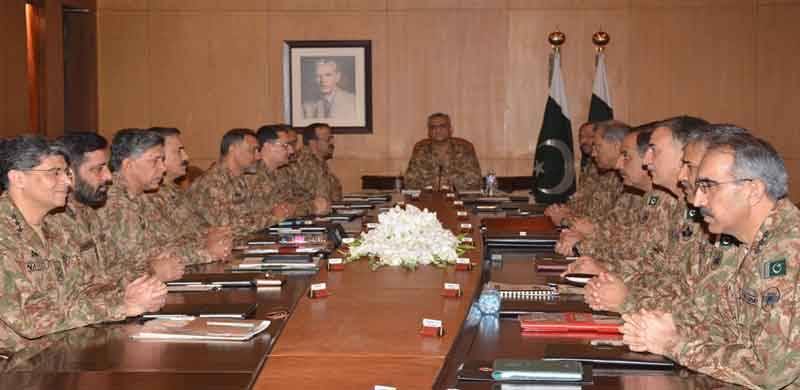
Inter Service Public Relations (ISPR) must be commended for issuing a calibrated, yet comprehensive press release after Corps Commanders’ Conference at GHQ Rawalpindi. It had to be reiterated once again that the prerogative for use of weapons rests with the state only. The need for reiterating this statement coupled with behind-the-curtain hectic diplomatic efforts made by Pakistan in the last two months clearly indicates the critical nature of prevailing global, regional and domestic environment. Needless to say, it has a great deal of relevance to the military establishment in Pakistan. The word ‘domestic’ was not even used in the press release while review of geo-strategic environment and situation on eastern borders was co-related to express strong will, resolve and determination for defending the country against any ‘aggression’ or ‘misadventure’.
The armed forces in both India and Pakistan are currently on the highest state of alertness. Therefore, the hybrid nature of threat and probability of misadventure from our eastern neighbour publicly expressed by both civil and military leadership justifies this strong resolve and will.
The way armed forces of Pakistan showed thorough professionalism in February this year is likely to act as a deterrent. And it also showed that Pakistan possesses the capability of a proportionate response to aggression. This does give some hope for peace.
Meanwhile, participants of the conference also made commitment to bringing enduring peace in the country and supporting initiatives towards regional peace. It was in the context of Afghanistan and was meant for a global audience, especially the US. Use of the word ‘support’ also indicated the degree, kind and intensity of pressure on military establishment.
However, the cardinal and most relevant aspect of the press release was the resolve to support the government and stakeholders in implementation of NAP.
General Bajwa's claims about having defeated terrorism indicate that the time for application of kinetic arm has long passed. Thus, the military has transited from a leading role to one of 'support'.
The need for political ownership was clearly reflective in the press release. But it showed that the ground realities were largely ignored. The present government, despite having will and resolve, lacks in ability, experience and even capacity to handle economy, security or governance.
What is the ground reality? Major concern for global powers and regional actors is the presence of non state actors on our soil, terrorism financing and money laundering index which also constitutes baseline for Financial Action Task Force (FATF). Risk factors which lower or rise this index include regulations, laws and procedures, corruption, financial standards, political environment, governance and law and order situation.
Military establishment is traditionally blamed for selective approach in handling the banned organizations and personnel on both western and eastern borders. Lack of deterrence due to prolonged court procedures was identified as a major grey area in post-NAP implementation strategy of 2014, and military courts were established through constitutional amendment for a period of five years which expired in January 2019. During this period, we should have re-consolidated the criminal justice system and made anti-terrorist courts effective through protection of judges, witnesses and by empowering the investigators. But it did not happen.
With no visible change in the last five years, military courts stand politicised by major political parties to win favours from government in its drive against corruption and money laundering.
The powerful media has also joined hands with these blackmailing forces to discredit the government and seriously dent its credibility. We have structural deficiencies in anti-money laundering and system of terror financing. These physical but strategic deficiencies also form basis of grey list of the FATF. Despite political will and resolve, steps required for meaningful results in implementation of NAP are dependent on legislation in the assembly. But it appears that opposition in the Parliament has joined hands to blackmail government even on issues pertaining to national security and economy of the country.
It's time for a synchronized, harmonized and collective resolve and open-handed support from military establishment so that the civilian government can deliver in these extraordinary environments. Military establishment must decide either to persistently support civil government in areas of concern or follow the policy of zero interference. Allegations of political interference has made the establishment apprehensive, reluctant and even indecisive on some occasions.
Resolve is required in the form of across-the-table and visible action against banned groups, organizations and terror-linked individuals to validate statement of General Bajwa about prerogative for use of weapons.
Support of civil government in its drive against money laundering and corruption has to be effective and without any fear of propaganda. Strong political ownership, enacting new laws, institutional reforms, synchronizing national laws, re-consolidating the criminal judicial system and rooting out money laundering and corruption are the primary tasks of civil government. But the government needs moral and physical support of military establishment. Success has many fathers but the failure of present government will only have one father: the military establishment.
